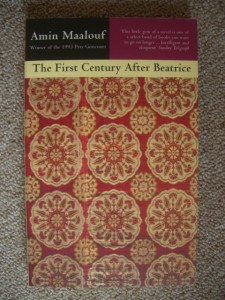Amin Maalouf – The First Century After Beatrice

I have been distracted from posting by (a) needing to do the mundanities of moving house (b) the necessity to be writing. And yet the books must go, and soon. Onward then, to the shelves.
I first read this book as part of a high level think-tank exercise. The think-tank, composed of a number of thinkers of international high renown, was looking at population and migration and this book, along with a whole stack of tomes from Malthus to UNHCR reports, was the grist from which we were supposed to mill … something.
I’m not sure we milled anything very much. But this elegant little fable certainly had an effect on me. Two things struck me very strongly – the first was the lyricism of the relationship between an anonymous entomologist who falls in love with a free-spirited woman. It is a love story of the most unusual type, in that it defies most conventions of relationships and writing about love, and it works on a prickly, sometimes disturbing, level. The second was the parable of economics that results from the scarcity of a product. In this case, the scarce product is young women, and it results from consumer choice – a form of bean, readily available and affordable, allows poor families to only have boy children. Their choice, inevitably and inexorably, is to do so – but the effect of the bean is irreversible. When a couple have their first boy child, they find they cannot have anything else … so who will produce the girls for those boys?
I don’t want to destroy the value of this book by spoilers, but it’s a fantastic exercise in terms of how, with extreme brevity, it explores the role of choice, the nature of gender bias and the way that commodification destroys humanity, on the individual and the global scale.
A keeper.



Recent Comments